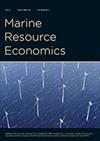Improving Utilization of the Queen Conch (Aliger gigas) Resource in Colombia
IF 2
3区 经济学
Q2 ECONOMICS
引用次数: 1
Abstract
A bioeconomic model was developed to investigate optimal exploitation strategies for the queen conch (Aliger gigas) resource in the Colombian Caribbean. Ecological and economic indicators substantially improved when the status quo management system based on sustained annual harvesting of the resource at a rate of 8% of the total exploitable biomass was replaced with a rotational harvesting scheme whereby fishing was conducted at a higher exploitation rate (30%), following a four-year closure period. Closures allowed queen conch biomass to recover and accumulate undisturbed, leading to an 11% increase in the average standing density of adult conchs and a 26% increase in the net present value of the fishery, as compared with the status quo scenario. Multiple sources of improvement associated with rotation of fishing areas were identified, such as the harvesting of larger quantities of conch meats and pearls as well as reduced fishing costs. In addition to an informed assessment of the economic potential of the fishery under rotational management, the model provides a useful benchmark to estimate the gains associated with further reductions in illegal, unreported, and unregulated fishing, which has brought the fishery to the brink of collapse in recent years.提高哥伦比亚皇后螺(Aliger gigas)资源利用
建立了一个生物经济模型来研究哥伦比亚加勒比地区皇后螺资源的最佳开发策略。在四年休渔期之后,以每年持续捕捞占总可利用生物量8%的资源为基础的现有管理制度被以更高的捕捞率(30%)进行捕捞的轮作捕捞计划所取代,生态和经济指标得到了显著改善。关闭后的海螺生物量得以恢复和不受干扰地积累,与现状相比,成年海螺的平均站立密度增加了11%,渔业净现值增加了26%。确定了与渔区轮作有关的多种改进来源,例如收获更多的海螺肉和珍珠以及降低捕捞成本。除了对轮作管理下渔业的经济潜力进行知情评估外,该模型还提供了一个有用的基准,用于估计进一步减少非法、未报告和无管制捕鱼所带来的收益。近年来,非法、未报告和无管制捕鱼已使渔业濒临崩溃的边缘。
本文章由计算机程序翻译,如有差异,请以英文原文为准。
求助全文
约1分钟内获得全文
求助全文
来源期刊

Marine Resource Economics
农林科学-渔业
CiteScore
4.30
自引率
10.30%
发文量
25
审稿时长
>12 weeks
期刊介绍:
Marine Resource Economics (MRE) publishes creative and scholarly economic analyses of a range of issues related to natural resource use in the global marine environment. The scope of the journal includes conceptual and empirical investigations aimed at addressing real-world oceans and coastal policy problems. Examples include studies of fisheries, aquaculture, seafood marketing and trade, marine biodiversity, marine and coastal recreation, marine pollution, offshore oil and gas, seabed mining, renewable ocean energy sources, marine transportation, coastal land use and climate adaptation, and management of estuaries and watersheds.
 求助内容:
求助内容: 应助结果提醒方式:
应助结果提醒方式:


